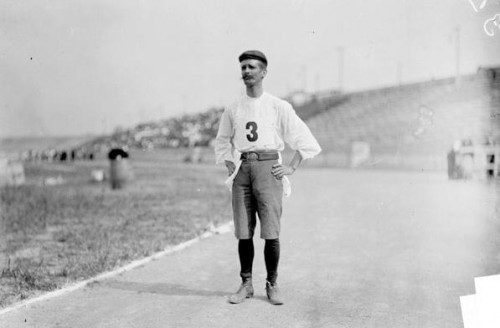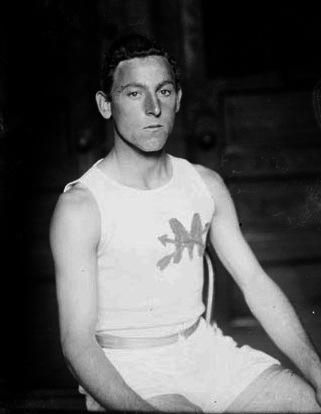
Cuban marathoner (and former mailman) Félix Carbajal Photo: Britannica.com

Fred Lorz, Olympic marathoner and practical joker, 1904. Photo: www.morethanthegames.co.uk
Posted on 08/08/2012 10:13:31 AM PDT by afraidfortherepublic

Cuban marathoner (and former mailman) Félix Carbajal Photo: Britannica.com

Fred Lorz, Olympic marathoner and practical joker, 1904. Photo: www.morethanthegames.co.uk
If anyone is intersted,
The marathon is still run from Marathon Greece (the original starting point) following the 2500 year old course to athens.
It is considered a “must do” event for all serious runners.
Just look up “athens marathon” on the net.
“Heat and humidity soared into the 90s, and the 24.85-mile course—which one fair official called “the most difficult a human being was ever asked to run over”—wound across roads inches deep in dust.”
I thought the marathon was 26.2 miles. Inflation strikes again?
I love articles like this. Since everything about the modern Olympics (drinks, clothes, condom sponsorships) seems to be an advertising opportunity, it’s nice to read a “how it used to be” story and get a few giggles out of it as well. Thanks for posting.
This is a disgrace. The 1906 games were run efficiently and were such a success that the Olympic movement was able to survive its previous two disasters to become what they are today. Yet the official Olympic records and museum exclude them.
Since the IOC is one of the most corrupt organizations on earth we can be sure they will never do the right thing. But if they did, they would restore these games to official Olympic recognition.
Bring back Tug O’ War!
I thought the marathon was 26.2 miles. Inflation strikes again?
The now traditional distance of 26 miles 385 yards dates from the 1908 London Olympics. It began that year at Windsor Castle (or Buckingham Palace; I forget which) so the royals inside could view the start. When they finished the race it was 26 miles 385 yards. For some reason (don't ask me why) that then became the traditional Marathon distance.
The actual route between Marathon and Athens (the course of the original 1896 Marathon) is actually a little shorter than this.
Ugh! HTML fault. My bad!
re Marathon:
What an incredible event!
Thank you for posting this great article.
Reminds me a bit of the very early days of the Indy 500, when in 1913 a Frenchman names Jules Goux is reported to have consumed 6 bottles of Champagne during the race, although recently, the PCPolice appear to be trying to minimize the amount of alcohol consumed to 6 pints or even six sips and only at pit stops. I even remember, when I first heard about this that the figure was some really prodigious amount, on the order of 15 or 16 bottles. He won by over 13 minutes. Go figure.
Wow! I thought I knew the Olympics, but I never heard of that. I did find out this week that the early games lasted months.
Competitions were spread out over as long as a half-year, so there wasn't much excitement or sense that "an event" was happening.
The 1906 Olympics or "Intercalated Games" pioneered the current format, and I guess that's why the Olympics survived. Why aren't they recognized by the IOC?
Marathon story: Postal employee on workers’ comp caught running Boston Marathon
One of the most unusual ultra-marathoners was an Australian named Cliff Young, who ran his first such race, the 544-mile Westfield Sydney-Melbourne, at age 61. Amazingly, he was able to run the race without stopping to sleep (something he'd learned while herding his family's flock of 2000 sheep on foot), taking just 5 days, 15 hours, and 4 minutes. This was almost two days shorter than the previous record.
Bookmark
I think I know a way to make the current event much more TV-friendly...
Actually, the first Olympiad in Athens in 1896 was also an "event" spread over just a week or so in April, and it was very well organized. After that, though, came the deluge.
The Olympics of 1900, 1904, 1908, 1920, and 1924 also were spaced out over months (over only three in the case of the 1924 games). 1912 was an exception for some reason. Apparently, though, the modern scheduling format didn't become a fixture until 1928.
The 1906 Olympics or "Intercalated Games" pioneered the current format, and I guess that's why the Olympics survived. Why aren't they recognized by the IOC?
Originally Coubertin wanted the games held in different international venues, beginning with Paris in 1900. But the Greeks not only wanted the games first (hence Athens in 1896), but they wanted to be the permanent host. A compromise was arrived at wherein the regular Olympics would be held in different worldwide locations while Athens would host an "intercalated games" every four years in years between Olympiads. Thus the 1906 games were intended to be the first of many (they were to be followed by similar games in 1910, 1914, 1918, etc.). Unfortunately, no other "intercalated games" ever materialized because of the precarious political situation in Greece and the Balkans in those days (with two separate wars just before WWI). So the record of the 1906 games just sort of hang there, belonging to nothing.
For a while they decided to recognize them as the special "tenth anniversary games," but as the years passed they continued to stick out like a sore thumb among otherwise orderly Olympiads, so eventually they were de-recognized altogether. For that reason the results, records, and medals are not part of Official Olympic history or the Olympic Museum in Switzerland.
The International Society of Olympic Historians, however, does recognize them as official Olympic Games . . . for all the lousy good that does.
piece of trivia: Coubertin’s heart (literally) is buried at a special location in ancient Olympia.
The king was lazy and they had to extend the course the additional 2.2 miles. Now marathoners are supposed to say something king related at 24 miles. Officially it is praise of the king/queen. Reality suggests runners say something else regarding the royal in power.
Disclaimer: Opinions posted on Free Republic are those of the individual posters and do not necessarily represent the opinion of Free Republic or its management. All materials posted herein are protected by copyright law and the exemption for fair use of copyrighted works.